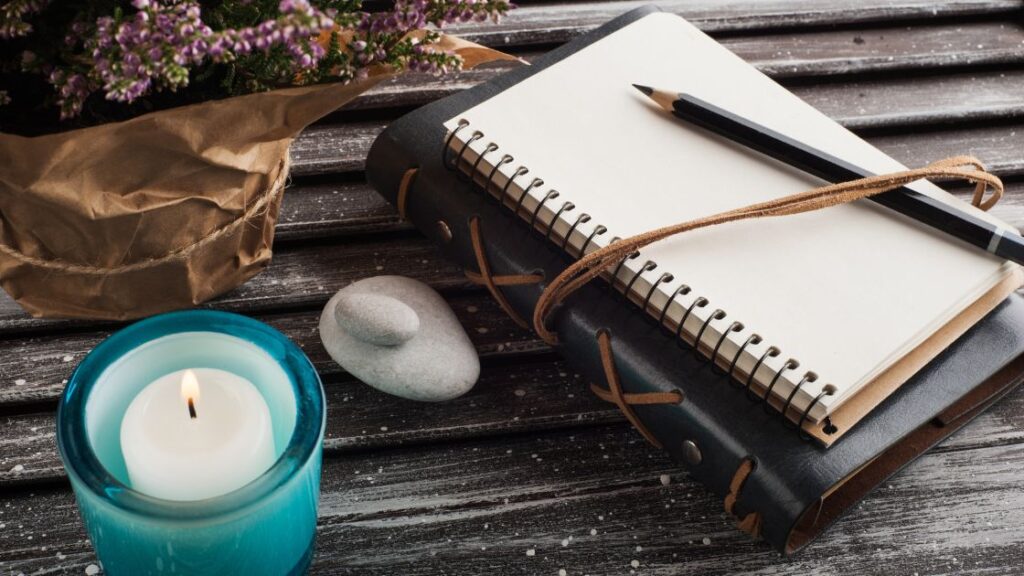Searching for fresh journaling ideas to jumpstart your journey of self-discovery? Consider ancestry journaling—a practice that can not only helps frame family history but can also reveal details and unconscious parts of our own personal story. Grab your favorite pen, a steaming cup of tea, and let’s explore some unique journaling ideas for enhancing self-awareness through ancestry journaling.
Why Journal About Ancestry?
Family History: Unearthing Roots and Resilience
Imagine finding an old leather-bound journal, its pages yellowed with time, revealing tales of courage, love, and survival of those who have gone before. When we explore our family history, we become time-travelers. We trace our lineage, discovering the unsung heroes who weathered storms, crossed oceans, and built the foundations of our present. Their resilience becomes our beacon, reminding us that we carry their legacy within us. Hearing ancestral stories of overcoming hardship gives us confidence that we too can rise to the circumstances of our own lives.
Family Dynamics: Patterns and Healing
In the cozy kitchen of our memories, family dynamics simmer like a hearty stew. Who played the peacemaker during Sunday dinners? Who wore the storyteller’s hat, spinning yarns of long-lost uncles and mysterious aunts? Journaling unveils these patterns—quirks passed down like heirlooms. But it’s not just about quirks; it’s about healing. Forgiving the stubborn uncle who never admitted he was wrong, understanding the silent aunt who hid her pain behind stoic smiles, and weaving compassion into our own lives. Through our family’s stories, we find solace and understanding.
Cultural Heritage: From Grandma’s Kitchen to the World
Our cultural heritage isn’t just about recipes and festivals; it’s a tapestry of identity. Imagine journaling about the scent of spices in Grandma’s kitchen—the same spices that traveled across continents, whispering stories of resilience and survival. The recipe for her chicken curry isn’t just a list of ingredients; it’s a connection to generations past. What do the smells and tastes and sounds of our heritage tell us about ourselves? Do we love cooking and music because it brings us a sense of comfort passed down through the ages? Writing about these memories and what they have come to mean in our modern life can enhance our understanding of our own tendencies and passions.
Historical Context: Ancestral Lives in Technicolor
History textbooks give us facts; ancestral journals paint emotions. Imagine your great-grandfather’s ink-stained pages during a world war. His fears, dreams, and love letters—etched forever. When we understand their context—the wars, revolutions, and explorations of foreign lands—we glimpse our own lives through the darkened lenses of history. Their struggles become our lessons, their triumphs our inspiration. By researching and writing about the specifics of the past, we shine a light on the perceptions and experiences of the present.
Interpersonal Relationships: Lessons from the Wise
Journal about the various tidbits of advice passed down through generations. What did Grandma share about love? “Darling, love isn’t about grand gestures; it’s in the quiet cups of tea shared after an argument.” How did that witty uncle phrase his constructive criticism that made everyone laugh but still hit the mark? Our ancestors gift us wisdom—the kind that doesn’t come from textbooks but from life well-lived. Capturing these moments and relating them to circumstances in your own life can provide valuable insights into discovering your own wisdom.
Journaling Ideas with Ancestral Themes
Research and Documentation: The Detective Work
Grab your magnifying glass! Dive into genealogy research like a curious Sherlock Holmes. Interview Aunt Mildred: she knows secrets buried in old photo albums. Unfold letters like delicate origami, each crease holding a piece of your family puzzle. And Google—it’s your time machine, whisking you to census records, ship manifests, and forgotten graveyards. Document everything—the faded photos, the yellowed birth certificates, and the cryptic notes in Great-Grandpa’s handwriting. Be the detective who uncovers forgotten stories that can be used to solve the problems you face in your daily life.
Visual Elements: Collages and Timelines
Think beyond words. Create collages—stick photos, maps, and Grandma’s handwritten recipe for apple pie. Let the faces smile at you from the pages. The crinkle of old photographs—their edges worn like the edges of memories—adds texture to your journal. Timelines—plot births, weddings, and moon landings. Trace the thread of your lineage across generations. Imagine the ink-stained quill of your great-great-grandmother as she signed her name on a marriage certificate. Let your journal breathe with visual memories. It’s like Instagram for your ancestors (minus the avocado toast). Each image tells a story; each timeline marks a milestone. And when you flip through those pages, you’ll hear their whispers—laughter, tears, and the rustle of time.
Embrace Vulnerability: Ink and Tears
Your journal isn’t a polished memoir; it’s raw, unfiltered. Be vulnerable. Pour your heart out. Cry over Great-Grandpa’s war medals—the ones he earned but never wore. Laugh at Aunt Edna’s quirky superstitions—the way she believed that dandelions carried wishes. Let your pen dance on the pages, leaving ink-stained footprints. Write about the fights, the secrets, the love that bloomed in unlikely corners. Acknowledge the gaps—the missing names, the blurred faces. Sometimes, the most profound revelations emerge from the ink-blots—the smudges where tears fell. Your journal isn’t just about preserving the past; it’s about understanding your own story. So, write fearlessly! Your words may possibly bridge generations, completing someone else’s story down the line.
Your Legacy in Words
As you close your journal tonight, remember this: your words are your legacy. They connect you to your ancestors and guide your future self. The ink you spill today becomes the compass for your great-grandchildren. Let the pages absorb your laughter, your grief, your dreams. Unearth the buried treasures—the forgotten lullabies, the recipes whispered over candlelight, the promises made under star-studded skies. Your journal isn’t just a record; it’s a conversation across time. And as you drift into sleep, imagine your ancestors leaning in, listening. Their smiles echo in the margins. Their love letters flutter like moth-worn wings. Happy journaling!
For ideas and prompts, visit these websites:


